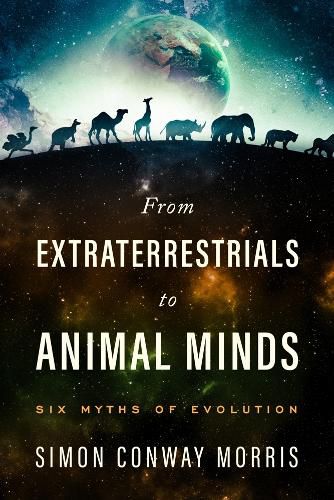Readings Newsletter
Become a Readings Member to make your shopping experience even easier.
Sign in or sign up for free!
You’re not far away from qualifying for FREE standard shipping within Australia
You’ve qualified for FREE standard shipping within Australia
The cart is loading…






In this learned romp of science writing, Cambridge professor Simon Conway Morris cheerfully challenges six assumptions–what he calls ‘myths’–that too often pass as unquestioned truths amongst the evolutionary orthodox.
His convivial tour begins with the idea that evolution is boundless in the kinds of biological systems it can produce. Not true, he says. The process is highly circumscribed and delimited. Nor is it random. This popular notion holds that evolution proceeds blindly, with no endgame. But Conway Morris suggests otherwise, pointing to evidence that the processes of evolution are seeded with inevitabilities.
If that is so, then what about mass extinctions? Don’t they steer the development of life in radically new directions? Rather the reverse, claims Conway Morris. Such cataclysms simply accelerate evolutionary developments that were going to happen anyway. And what about that other evolutionary canard: the missing link ? Plenty to choose from in the fossil record but what is persistently over-looked is that in any group there is not one but a phalanx of missing links . Once again we under-score the near-inevitability of evolutionary outcomes.
Turning from fossils to minds, Conway Morris critically examines the popular tenet that the intelligences of humans and animals basically are the same thing, a difference of degree not kind. A closer scrutiny of our minds shows that in reality an unbridgeable gulf separates us from even the chimpanzees, so begging questions of consciousness and Mind.
Finally, Conway Morris tackles the question of extraterrestrials. Surely, the size and scale of the universe suggest that alien life must exist somewhere beyond Earth and our tiny siloed solar system? After all, evolutionary convergence more than hints that human-like forms are universal. But Dr. Conway Morris has serious doubts. The famous Fermi Paradox ( Where are they? ) appears to hold: Alone in the cosmos–and unique, but not quite in the way one might expect.
$9.00 standard shipping within Australia
FREE standard shipping within Australia for orders over $100.00
Express & International shipping calculated at checkout
In this learned romp of science writing, Cambridge professor Simon Conway Morris cheerfully challenges six assumptions–what he calls ‘myths’–that too often pass as unquestioned truths amongst the evolutionary orthodox.
His convivial tour begins with the idea that evolution is boundless in the kinds of biological systems it can produce. Not true, he says. The process is highly circumscribed and delimited. Nor is it random. This popular notion holds that evolution proceeds blindly, with no endgame. But Conway Morris suggests otherwise, pointing to evidence that the processes of evolution are seeded with inevitabilities.
If that is so, then what about mass extinctions? Don’t they steer the development of life in radically new directions? Rather the reverse, claims Conway Morris. Such cataclysms simply accelerate evolutionary developments that were going to happen anyway. And what about that other evolutionary canard: the missing link ? Plenty to choose from in the fossil record but what is persistently over-looked is that in any group there is not one but a phalanx of missing links . Once again we under-score the near-inevitability of evolutionary outcomes.
Turning from fossils to minds, Conway Morris critically examines the popular tenet that the intelligences of humans and animals basically are the same thing, a difference of degree not kind. A closer scrutiny of our minds shows that in reality an unbridgeable gulf separates us from even the chimpanzees, so begging questions of consciousness and Mind.
Finally, Conway Morris tackles the question of extraterrestrials. Surely, the size and scale of the universe suggest that alien life must exist somewhere beyond Earth and our tiny siloed solar system? After all, evolutionary convergence more than hints that human-like forms are universal. But Dr. Conway Morris has serious doubts. The famous Fermi Paradox ( Where are they? ) appears to hold: Alone in the cosmos–and unique, but not quite in the way one might expect.